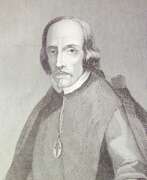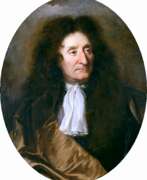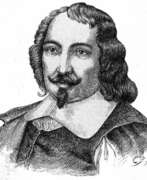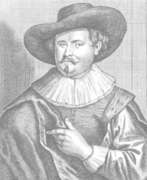Playwrights 17th century
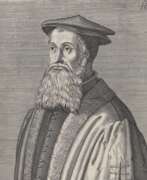

John Bale was an English churchman, historian and controversialist, and Bishop of Ossory in Ireland. He wrote the oldest known historical verse drama in English (on the subject of King John), and developed and published a very extensive list of the works of British authors down to his own time, just as the monastic libraries were being dispersed. His unhappy disposition and habit of quarrelling earned him the nickname "bilious Bale".
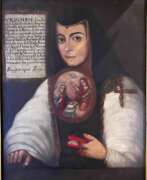

Juana Inés de la Cruz or Juana of Asbaje, real name Juana Inés de Asbaje Ramírez de Santillananota, was a Mexican poet, scholar, and writer of the Latin American colonial period and the Spanish Baroque, and a Jerónimo nun.
Juana Ramírez was born into a poor family (Spanish father and Creole mother) and from an early age showed a burning thirst for knowledge and giftedness, but as a woman she was almost entirely self-taught. By her teens, she had already learned Greek logic and taught Latin to young children. She also learned Nahuatl, an Aztec language spoken in Central Mexico, and wrote several short poems in the language. At the age of 16, the girl was introduced to the court, and her intelligence impressed even Viceroy Antonio Sebastian de Toledo, Marquis de Mancera, and in 1664 he invited her to serve as maid of honor.
In 1669, at the age of 21, she took her tonsure at the Convent of Santa Paula of the Hieronymite Order in Mexico City, where she remained a recluse for the rest of her life. In the convent, Sister Juana enjoyed exceptional freedom: she continued to socialize with scholars and senior members of the court, amassed one of the largest private libraries in the New World, as well as a collection of musical and scientific instruments. Her plays in verse, poetry, and compositions for state and religious festivals were frequently and successfully performed at the palace.
Sister Juana was an outstanding representative of Spain's Golden Age: she was the last significant writer of the Latin American Baroque and the first great exponent of colonial Mexican culture. Sister Juana wrote sonnets, romances, and ballads, drawing on a vast store of classical, biblical, philosophical, and mythological sources. She also composed moral, satirical, and religious texts, as well as many poems praising courtiers, but she also defended women's right to education.
At the end of her life, due to pressure from religious dogmatists, Sister Juana had to sell her extensive library of some 4,000 volumes and return to strict reclusiveness. In 1695, the plague struck the convent and, while caring for her sisters, Juana died of the disease at about the age of forty-four.
Today, Juana Inés de la Cruz is a national icon of Mexico and Mexican identity as a prominent writer of the Spanish-American colonial period. The former convent where she lived is a center of higher education, and her image adorns Mexican currency.


Armand-Jean du Plessis, duc de Richelieu, also known as Cardinal Richelieu or the Red Cardinal (French: l'Éminence rouge) was a Roman Catholic cardinal, aristocrat and statesman of France.
Armand Jean's father, François du Plessis, Signor de Richelieu, was the grand proclaimer (chief magistrate) of Henry III, but left his family devastated at his death. At the age of 22, Armand was ordained a priest and began to build a career. Thanks to his intellectual talents, he was soon appointed chaplain to the new Queen Anne of Austria, and in 1616 he was appointed Secretary of State for War and Foreign Affairs. Further events and a palace coup led to his exile, but he returned to Paris five years later.
The Duc de Richelieu became a cardinal in 1622, and from 1624 until his death in 1642 he was chief minister to King Louis XIII of France. His main goals were to establish royal absolutism in France and to end the Spanish-Habsburg hegemony in Europe. He made significant strides in reforming France, especially in terms of the administrative structure of the government.
The intrigues of his opponents accompanied the Duc de Richelieu throughout his political life. In the last years of his life he found himself involved in religious conflicts, in opposition to the pope in a struggle with the French church over the distribution of revenues intended to finance the war.
Richelieu possessed outstanding intellectual ability, willpower, and industriousness. He directed his own wealth to patronizing the arts and the University of Paris; he established the French Academy. Richelieu was also a talented playwright and musician.
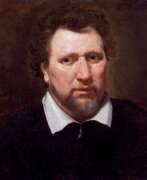

Ben Jonson or Benjamin Jonson was an English poet, playwright, actor and dramatic theorist.
Jonson came from a simple family, served in the army, seriously engaged in self-education, and in 1586 began a career in the theater. In the 1590s he had the good fortune to meet William Shakespeare. In 1598 Shakespeare was able to put in the theater "Globe" Jonson's play "Every man for his own good," where he played one of the roles. The two playwrights became friends and collaborated on productions of the plays. Jonson was one of the most erudite playwrights of his time and was sure to apply his deep knowledge of Greek and Roman classics in his work.
Jonson's daring character failed him more than once: he often got into fights and duels, and later began to prefer direct violence mockery of his opponents in his plays. But even in this case, he not once got into serious trouble and even sat in prison.
In 1605 Jonson with great success put in the "Globe" play "Volpone". A great admirer of Johnson's work was King James, and the next ten years were the most colorful in his career. His plays written between 1605 and 1615 - Epicoen, The Alchemist, Catalina, Bartholomew Fair and The Devil is an Ass - were a great success, rivaling Shakespeare himself.
Ben Jonson is a vivid representative of English literature of its Renaissance period. His best works ridicule human weaknesses with the help of comic realism, verbal brilliance and a remarkable gift for caricature and parody.


William Shakespeare was a British poet and playwright and writer.
William's father, John Shakespeare, was a merchant and official in Stratford. There are reports that he was a sailor for a time before joining a theater company in London. Beginning in the 1590s, Shakespeare began writing plays, and in 1593 he published a poem, Venus and Adonis, which became popular. He dedicated it to the Duke of Southampton, who was a philanthropist and patron of talent, and soon his business was booming.
From 1592 to 1600 Shakespeare wrote his dramas and romantic comedies "Richard III", "The Taming of the Shrew", "Romeo and Juliet", "A Midsummer Night's Dream" and "The Merchant of Venice", as well as the comedies "Much Ado About Nothing", "Twelfth Night" and the tragedy "Julius Caesar". The playwright's business was so successful that he even bought a large house in Stratford. In 1599, Shakespeare became one of the owners, playwright and actor of the new theater "Globe". In 1603 King James took Shakespeare's troupe under his direct patronage. In the mature period, the great playwright turned to tragedies, there were "Hamlet", "Othello", "King Lear", "Macbeth" and others.
Although in the 19th century researchers had some doubts about the authorship of many of these works, William Shakespeare is considered the greatest English playwright, one of the best playwrights in the world. His plays have been translated into all major languages and to this day form the basis of the world theatrical repertoire, most of them have been screened many times. According to the Guinness Book of Records, Shakespeare remains the world's best-selling playwright, and his plays and poems have sold more than 4 billion copies in the nearly 400 years since his death.
